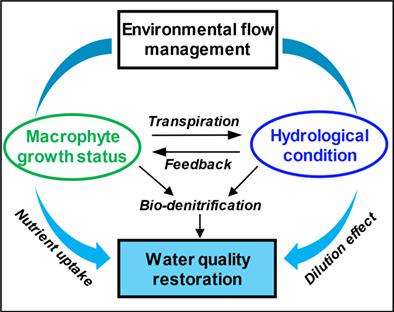当前位置:
X-MOL 学术
›
Hydrol. Process.
›
论文详情
Our official English website, www.x-mol.net, welcomes your feedback! (Note: you will need to create a separate account there.)
Optimizing environmental flow and macrophyte management for restoring a large eutrophic lake‐marsh system
Hydrological Processes ( IF 3.2 ) Pub Date : 2020-11-04 , DOI: 10.1002/hyp.13965 Zhihao Xu 1 , Ying Yang 1 , Chunxue Yu 1 , Zhifeng Yang 2
Hydrological Processes ( IF 3.2 ) Pub Date : 2020-11-04 , DOI: 10.1002/hyp.13965 Zhihao Xu 1 , Ying Yang 1 , Chunxue Yu 1 , Zhifeng Yang 2
Affiliation

|
With increasing environmental degradation from eutrophication, management strategies associated with eutrophic water restoration initiatives are necessary and have garnered wide interest. Macrophytes contribute to water quality improvement in lake‐marsh systems through nutrient uptake, while causing considerable water loss through transpiration. In reverse, hydrological variations affect macrophyte growth status and thus phytoremediation performance. The interactions between hydrological and ecological processes in lake‐marsh systems are complex, but environmental flow management strategies accounting for these interactions have been rarely proposed. Accordingly, this study combines environmental flow and macrophyte management in the restoration of a large eutrophic lake‐marsh system, accounting for interactions between hydrological and nutrient removal processes. We consider both nutrient uptake and transpiration‐driven water loss of macrophytes as well as the impacts of hydrological conditions on macrophyte growth status and sediment biological denitrification. Regulating upstream dam operation is an effective measure for environmental flow management. Thus, we develop an optimization model to guide upstream water release while simultaneously regulating macrophyte area in a lake‐marsh system, aiming to minimize the ratio of environmental flow demand to reservoir water availability and maintain satisfactory water quality in the system throughout the year. A genetic algorithm is adopted for solving the optimization model. By applying the method in a typical lake‐marsh system (Baiyangdian) in China as a case, we introduce a new macrophyte management regime (for area cover and harvesting regimes) and an optimal environmental flow management schedule. Results show that appropriate monthly fluctuations in wetland water level are beneficial to phytoremediation performance, and harvesting macrophytes in stages is effective in reducing transpiration‐driven water loss without inordinately damaging nutrient uptake by macrophytes. This study offers a useful tool for lake‐marsh system restoration management and highlights the significance of regulating hydrological processes in water quality restoration.
更新日期:2021-01-13



























 京公网安备 11010802027423号
京公网安备 11010802027423号